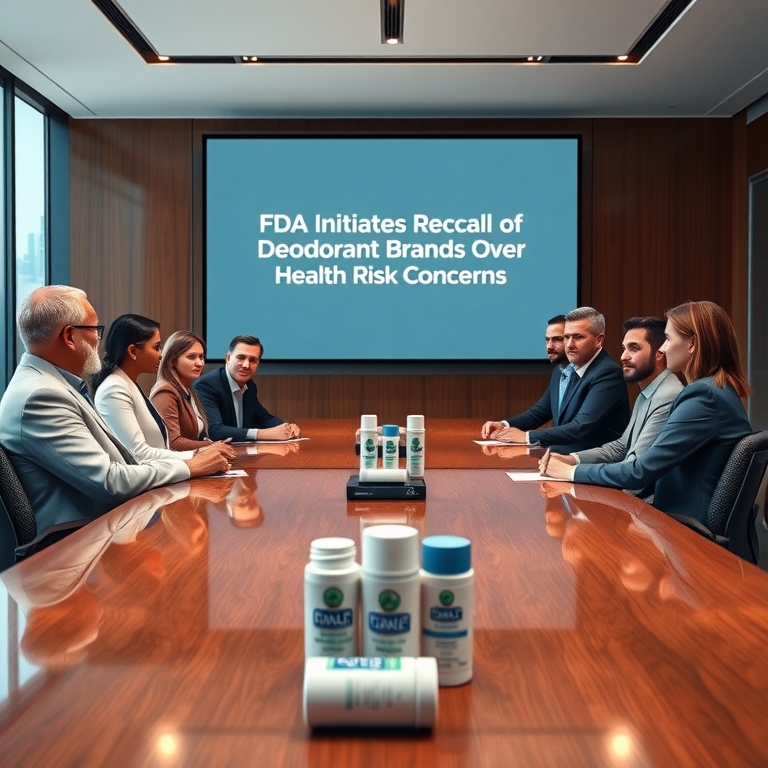In an unexpected announcement that has sent ripples through both the consumer goods industry and its vast customer base, the Food and Drug Administration (FDA) has initiated a recall of several popular deodorant brands. This move, driven by growing health risk concerns, underscores the agency’s commitment to ensuring the safety and well-being of consumers, while simultaneously raising questions about regulatory oversight and manufacturing practices within the personal care product sector.
The recall was prompted by recent findings that revealed potentially harmful substances in some deodorant formulations. These substances, which were unidentified by the manufacturers at the time of production, have been linked to adverse health effects. The specific compounds in question have not been publicly detailed as investigations are ongoing, but the FDA’s swift action highlights the urgency and seriousness of the situation. The agency has emphasized that its decision to recall these products was not made lightly but was necessary to prevent potential harm to consumers.
For decades, deodorants have been an essential part of daily personal hygiene routines, used by millions to combat body odor and maintain freshness. The affected brands, some of which are household names, have enjoyed widespread consumer trust and loyalty. The revelation of health risks associated with these products has therefore come as a shock to many. Consumers who have faithfully used these brands for years are now grappling with the uncertainty of potential health implications. In response to this, the FDA has assured the public that it is working closely with manufacturers to address the issues and ensure that only safe products remain on the market.
The recall has also sparked a broader conversation about the regulation of personal care products in the United States. Unlike pharmaceuticals, which undergo rigorous testing and approval processes before reaching the market, personal care products, including deodorants, are subject to less stringent regulations. This regulatory gap has long been a point of contention among consumer advocacy groups, who argue that the lack of comprehensive oversight leaves room for potentially harmful substances to make their way into everyday products. The current situation may well catalyze efforts to reform these regulatory frameworks, pushing for stricter guidelines and more robust testing procedures before products are deemed safe for public use.
In the immediate aftermath of the recall announcement, affected companies have been quick to respond. They have pledged full cooperation with the FDA and are conducting their own internal investigations to identify the source of contamination and prevent future occurrences. These companies are also offering refunds and exchanges to customers who have purchased the recalled products, in an effort to maintain goodwill and demonstrate their commitment to consumer safety. However, the long-term impact on these brands’ reputations remains to be seen. Trust, once shaken, can be difficult to rebuild, and it will require transparency, accountability, and consistent quality assurance to regain consumer confidence.
The recall has also had significant implications for the stock market, with shares of the affected companies experiencing a noticeable dip following the announcement. Investors, wary of the potential financial and reputational fallout, are closely monitoring how these companies handle the situation. It is a stark reminder of the interconnected nature of consumer trust and corporate valuation, where a single health scare can impact not only the bottom line but also investor sentiment and market dynamics.
For consumers, the recall serves as a crucial reminder of the importance of being informed and vigilant about the products they use daily. It underscores the need for awareness about product ingredients and the potential risks associated with them. In an age where information is readily accessible, consumers are increasingly empowered to make informed choices, and this recall may well lead to a shift in purchasing behaviors, with more individuals opting for products that prioritize safety and transparency in their formulations.
As the FDA continues its investigation, the personal care industry as a whole is likely to face increased scrutiny. This incident could serve as a catalyst for broader changes, prompting companies to adopt more rigorous testing protocols and prioritize safer ingredient alternatives. It could also lead to legislative changes aimed at strengthening the regulatory oversight of personal care products, ensuring that consumer safety is always at the forefront.
In conclusion, the FDA’s recall of several deodorant brands over health risk concerns is a pivotal moment for the personal care industry. It highlights the critical role of regulatory bodies in safeguarding public health and underscores the need for greater transparency and accountability within the sector. As companies, consumers, and regulators navigate the complexities of this situation, the hope is that it will lead to positive changes that enhance product safety and restore consumer trust. The coming months will be critical in shaping the future of the industry, and all eyes will be on how these developments unfold.

Leave a Reply